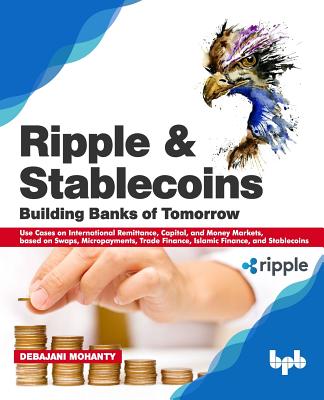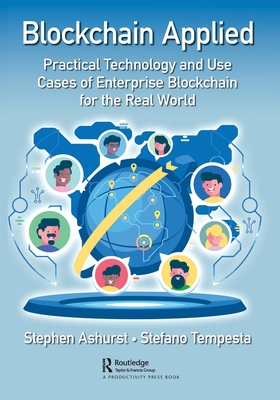Ripple and Stablecoins: Building Banks of Tomorrow: Use Cases on International Remittance, Capital, and Money Markets, based on Swaps, Micropa
暫譯: Ripple 與穩定幣:未來銀行的建構:基於交換、微支付的國際匯款、資本及貨幣市場案例分析
Macmillen, Hugh, Mohanty, Debajani
- 出版商: BPB Publications
- 出版日期: 2019-07-26
- 售價: $970
- 貴賓價: 9.8 折 $950
- 語言: 英文
- 頁數: 188
- 裝訂: Quality Paper - also called trade paper
- ISBN: 9389423198
- ISBN-13: 9789389423198
-
相關分類:
區塊鏈 Blockchain
海外代購書籍(需單獨結帳)
相關主題
商品描述
Step-by-step guide to learn Ripple and explore $155 trillion+ market on international remittance
Key Features Know the inefficiencies of banks in international remittance and how Ripple can help Learn Ripple's architecture and its product offerings such as xCurrent, xRapid, and xVia Acquire development skills on Ripple's XRP ledger Understand and apply all the features of XRP ledger, such as direct and partial payments, escrows, checks, micropayments, and fees Learn to integrate XRP ledger with your traditional and Blockchain-based solution in trade finance, e-auction, money market, swaps, and more Learn operation of Stablecoins and how to implement them in Islamic banking Know the wide spectrum of acceptance of Ripple across the globe
Description
The book is written for all IT professionals. It starts with the loopholes existing in the banking as well as payment industry, especially in the international remittance space, that have led to the invention of Bitcoin, a Blockchain product, followed by Ethereum, and finally Ripple. The book focuses on Ripple's architecture and the different open source and enterprise products offered by Ripple, which have been widely adopted by the global payment industry today. For developers, there are adequate examples covering Ripple's development APIs with different features such as instant payment, partial payment, escrow, checks, and micropayment. In later chapters, the book reviews different use cases on money market, e-auction, trade finance, swaps, etc., which will help you greatly to use Ripple and create new business models for international trading. In last few chapters, the book focuses on some of the leading Stablecoins such as JPM Coin, Libra, and Tether that are threatening to disrupt the finance industry. Use cases on tokenization and Stablecoins are discussed, especially in Islamic banking, which is an area less travelled by industry leaders. Finally, the book elaborates how Ripple has invaded the global market and lists the major players in this space so far.
What will you learn
By the end of the book, readers will have enough information on the right usage of Ripple to create value for their business models by eliminating age-old, lengthy, expensive payment channels with frictionless commerce for smoother execution of business processes. Business scenarios and solutions are provided, along with flowcharts, diagrams, and sample codes, that stakeholders can refer to and further enhance, as per their respective business need, and deploy them in live projects. The best and unique part of the book is that all the examples are written in Java, which most readers understand.
Who this book is for
Influencers, customers, decision makers, or developers - this book would be very useful for any reader who is eager to learn the industry's vision on Ripple, or the use cases that can benefit from Ripple and crypto adoption, or wish to develop applications connected to the rippled server for upgrading their payment mechanism.
Table of Contents
Debajani Mohanty is a solution architect who has been involved in large-scale projects and has built many scalable enterprises for B2B and B2C products, right from conceptualization to marketing, in varied domains such as travel, e-governance, e-commerce, and BFSI.
Key Features
Description
The book is written for all IT professionals. It starts with the loopholes existing in the banking as well as payment industry, especially in the international remittance space, that have led to the invention of Bitcoin, a Blockchain product, followed by Ethereum, and finally Ripple. The book focuses on Ripple's architecture and the different open source and enterprise products offered by Ripple, which have been widely adopted by the global payment industry today. For developers, there are adequate examples covering Ripple's development APIs with different features such as instant payment, partial payment, escrow, checks, and micropayment. In later chapters, the book reviews different use cases on money market, e-auction, trade finance, swaps, etc., which will help you greatly to use Ripple and create new business models for international trading. In last few chapters, the book focuses on some of the leading Stablecoins such as JPM Coin, Libra, and Tether that are threatening to disrupt the finance industry. Use cases on tokenization and Stablecoins are discussed, especially in Islamic banking, which is an area less travelled by industry leaders. Finally, the book elaborates how Ripple has invaded the global market and lists the major players in this space so far.
What will you learn
By the end of the book, readers will have enough information on the right usage of Ripple to create value for their business models by eliminating age-old, lengthy, expensive payment channels with frictionless commerce for smoother execution of business processes. Business scenarios and solutions are provided, along with flowcharts, diagrams, and sample codes, that stakeholders can refer to and further enhance, as per their respective business need, and deploy them in live projects. The best and unique part of the book is that all the examples are written in Java, which most readers understand.
Who this book is for
Influencers, customers, decision makers, or developers - this book would be very useful for any reader who is eager to learn the industry's vision on Ripple, or the use cases that can benefit from Ripple and crypto adoption, or wish to develop applications connected to the rippled server for upgrading their payment mechanism.
Table of Contents
- Introduction
- Ripple Architecture
- Development With Ripplenet and Xrp
- Use Case Micropayments
- Use Case Instant Security Settlement in Stock Market
- Use Case Settlement for Intraday Trading in Money Market
- Use Case Derivatives and Swaps
- Trade Finance
- Stable Coins
- Use Case Islamic Banking
- Banks of Tomorrow
Debajani Mohanty is a solution architect who has been involved in large-scale projects and has built many scalable enterprises for B2B and B2C products, right from conceptualization to marketing, in varied domains such as travel, e-governance, e-commerce, and BFSI.
商品描述(中文翻譯)
逐步指南學習Ripple並探索超過155兆美元的國際匯款市場
主要特點
描述
本書是為所有IT專業人士撰寫的。它從銀行及支付行業中存在的漏洞開始,特別是在國際匯款領域,這些漏洞導致了比特幣的發明,這是一種區塊鏈產品,隨後是以太坊,最後是Ripple。本書專注於Ripple的架構以及Ripple提供的不同開源和企業產品,這些產品如今已被全球支付行業廣泛採用。對於開發者,本書提供了足夠的範例,涵蓋Ripple的開發API,具有即時支付、部分支付、保管、支票和微支付等不同功能。在後面的章節中,本書回顧了貨幣市場、電子拍賣、貿易融資、掉期等不同的使用案例,這將大大幫助您使用Ripple並為國際貿易創造新的商業模式。在最後幾章中,本書專注於一些主要的穩定幣,如JPM Coin、Libra和Tether,這些穩定幣威脅著金融行業的變革。特別是在伊斯蘭銀行中,討論了代幣化和穩定幣的使用案例,這是一個行業領導者較少涉足的領域。最後,本書詳細說明了Ripple如何進入全球市場,並列出迄今為止在這一領域的主要參與者。
您將學到什麼
在本書結束時,讀者將擁有足夠的信息,正確使用Ripple為其商業模式創造價值,通過消除古老、冗長、昂貴的支付渠道,實現無摩擦的商業交易,以便更順利地執行商業流程。提供了商業場景和解決方案,並附有流程圖、圖示和範例代碼,利益相關者可以根據各自的商業需求進一步參考和增強,並在實際項目中部署。本書最好的獨特之處在於所有範例均以Java編寫,這是大多數讀者所理解的。
本書適合誰
影響者、客戶、決策者或開發者——本書對於任何渴望了解行業對Ripple的願景、能夠從Ripple和加密貨幣採用中受益的使用案例,或希望開發與Ripple伺服器連接的應用程序以升級其支付機制的讀者都非常有用。
目錄
- 介紹
- Ripple架構
- 使用Ripplenet和XRP進行開發
- 使用案例:微支付
- 使用案例:股票市場的即時安全結算
- 使用案例:貨幣市場的日內交易結算
- 使用案例:衍生品和掉期
- 貿易融資
- 穩定幣
- 使用案例:伊斯蘭銀行
- 明日銀行
Debajani Mohanty是一位解決方案架構師,參與了大規模項目,並為B2B和B2C產品建立了許多可擴展的企業,涵蓋了從概念化到市場推廣的多個領域,如旅遊、電子治理、電子商務和銀行、金融服務及保險(BFSI)。











